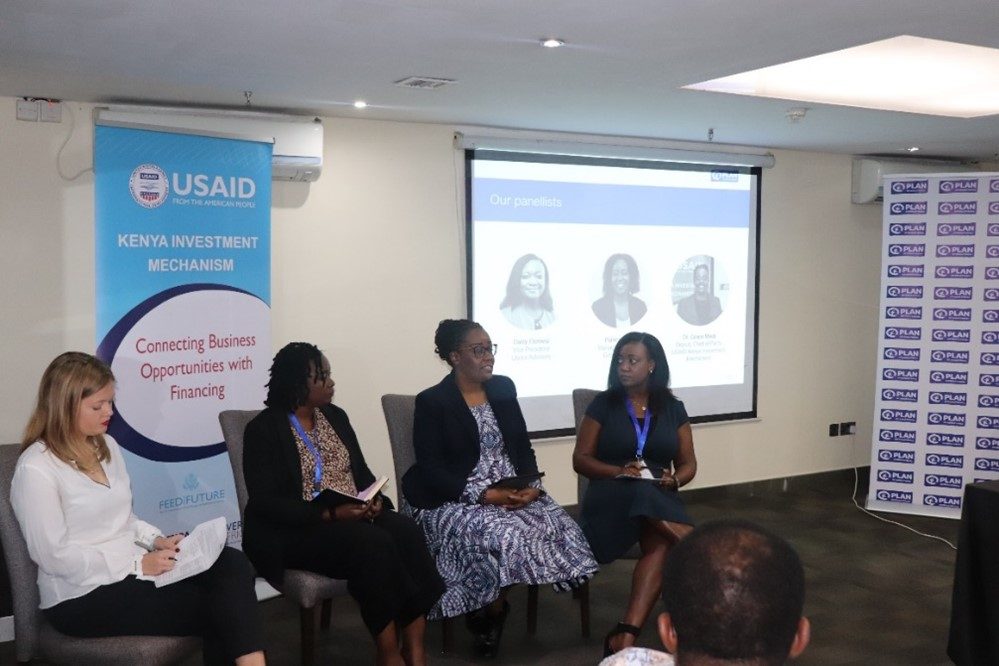Gender Lens Investing
Empowering marginalised women to create and lead their own social impact companies that help build their communities.
Through gender lens investing, Plan International seeks to build collaborations in Kenya that will grow women-owned and gender-inclusive businesses.
Author: Agnes Makena, Gender Lens Enterprise Lead

In July 2021, Plan International launched a pilot programme in Kenya to develop its strategy for the gender lens investing market.
To complement our core programmatic work, Plan International is exploring its role within the gender lens investing (GLI) and social entrepreneurship ecosystems to develop financially sustainable solutions to the issues faced by women and girls. In the first phase of the pilot, Plan International conducted research into the gender lens investing market gaps in Kenya.
Through this research – ‘Disruptive Roles in the Gender Lens investing Market in Kenya’ – we identified a critical market need for small ticket size funding that is affordable and matches the needs of women-owned and gender-inclusive businesses.
A market opportunity to bridge this financing gap is through the provision of concessional capital to create more accessible financing and technical assistance for women-owned and gender-inclusive businesses.
Concessional capital refers to financing provided by philanthropic or public investors at below-market terms to lower the overall cost of capital or to provide an additional layer of protection to private investors. This capital can take a range of forms, including grants, debt at below-market rates and equity with asymmetrical returns. Concessional capital improves the risk-return profile of an opportunity, making it more attractive to commercial investors.
Specifically, concessional capital could be used to offer smaller-ticket investments, structure more innovative instruments and provide technical assistance to businesses. Despite increasing interest in GLI, capital providers often lack access to appropriate sources of concessional capital. This deters them from taking a long-term, impact-focused approach and results in capital providers seeking shorter term, higher return investments.
One of the ways to deploy concessional capital is through blended finance structures.
Convergence defines blended finance as the use of catalytic capital from public or philanthropic sources to increase private sector investment in sustainable development. The African Guarantee Fund is an example of the important role that blended finance structures can play in easing access to finance for African SMEs.
Designed in 2012, the African Guarantee Fund is a blended finance structure which leverages concessional funding from the African Development Bank, other donors and development finance institutions to provide credit guarantees and capacity building to financial institutions and thereby help them increase their exposure to SMEs. By reducing the risk associated with SME financing and strengthening the capacity of banks to deliver financing to SMEs, the African Guarantee Fund has benefitted over 20,800 SMEs, 30% of which are women-owned and -led businesses.

On 6 May 2022, Plan International invited various capital suppliers, funders and intermediaries to a GLI stakeholder event aimed at identifying and discussing blended finance structures and partnerships that can enhance the gender lens investing market.
Plan International was joined by prominent panellists: Grace Mwai (Deputy Chief of Party at USAID Kenya Investment Mechanism), Patricia Jumi (Director at Growth Africa) and Daisy Etemesi (Vice President at Ubora Advisors).The panellists shared their first-hand experience working with concessional capital and blended finance structures. Concessional capital can be a critical tool to incentivise existing players to enter underserved sectors or target underserved audiences, such as women-owned businesses.
The Kenya Investment Mechanism, a five-year USAID program that is facilitating USD 520m in investment into key sectors of Kenya’s economy, uses smart incentives to mobilize finance for development in targeted sectors including agriculture, clean energy and women-owned businesses. Concessional capital also plays a critical role in financing the capacity building support that women entrepreneurs often require to successfully operate their businesses. An example of this is IFC’s ScaleX program, which provides financial incentives to incubators and accelerators that support women-owned businesses to raise venture capital.
Blended finance will form a critical part of Plan International’s gender lens investing strategy as a mechanism to develop more gender inclusive investment processes and instruments and provide technical assistance to women-owned and gender-inclusive businesses.
As Plan International progresses with its GLI pilot, it seeks to build collaborations in the Kenya ecosystem that will drive more affordable and targeted funding that will grow women-owned and gender-inclusive businesses.